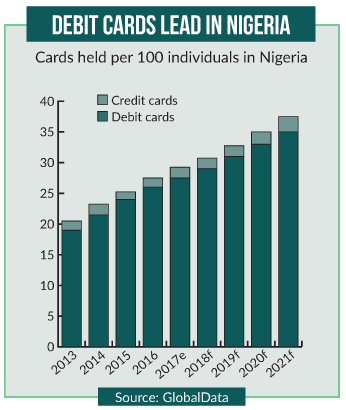Wema Bank is accelerating change throughout the banking sector in Nigeria. Its digital outlook and launch of ALAT reveal its efforts to create a financially inclusive and agile environment. MD and CEO Ademola Adebise speaks to Briony Richter about the bank’s digital strategy
In 2009, Wema Bank brought new management on board to begin a transformational journey that would see it become a regional bank in 2013, and back to being a national bank in 2015.

Access deeper industry intelligence
Experience unmatched clarity with a single platform that combines unique data, AI, and human expertise.
Since then it has moved quickly and strategically. Aiming to hold its ground and compete against younger financial organisations, Wema embarked on a digital journey. A desire to make banking easy for its customers, Wema is streamlining all its banking services, enabling a frictionless banking process for customers while cutting operating costs.
Speaking about what Wema offers, MD and CEO Ademola Adebise says: “As a financial institution that prioritises customer experience, we deploy a range of services across different touchpoints to ensure we meet our customers at every point of interaction.
“We have a dedicated call centre, called the Purple Connect, that attends to all phone inquiries from potential and existing customers. We also arm our contact centre with listening tools to respond in real time to complaints and inquires made across social media platforms.”
Adebise continues: “While these digital deployments have enhanced customer service and interactions, we do not relegate the importance of physical and traditional interactions with our customers. Our relationship managers regularly visit or call customers to ensure the bank remains top of mind and that their needs are actively met.”

US Tariffs are shifting - will you react or anticipate?
Don’t let policy changes catch you off guard. Stay proactive with real-time data and expert analysis.
By GlobalDataAdebise has held his current role since January 2017. Part of Wema’s executive management team since 2009, he has played a key role in the bank’s strategic turnaround. 2018 has been a transformative year for the banking sector. The growing dynamism of financial services combined with the vast number of fintechs entering the market have forced banks and other financial to do things differently.
Although these factors pose a challenge for banks, the changing environment, powered by digital technology, is also an opportunity for banks to set their course for a digital future.

Branches and technology
It is often assumed that the rise of digital-only banks will be the death of branches. While it is true that consumers on a mass scale are accessing accounts digitally every day, many still want the option to check in to a branch and interact with staff for certain services; Wema believes in combining the best of both channels to create a seamless and unified experience.
Adebise notes: “We believe in a healthy balance. Digital is the future, and in the competitive and dynamic environment we have today, employing innovative digital solutions – like we’ve done with ALAT, *945# [Unstructured Supplementary Service Data banking, which enables telephone banking by dialling a series of codes], card control and the virtual dollar card – is the most effective way to scale up and expand your reach. However, it is also important that we’re aware of the market in which we operate, and the readiness of the market to completely embrace these solutions.”
Wema is certainly accelerating its digital capabilities, as that is where it sees the future. However, digital technology also holds the key to creating the branch of the future, and that is also where Wema is focuses its efforts.
The bank branch as we know it, with tellers and small cubicles, will change – it has to in order to survive. Wema Bank does not see it as strategically viable to simply add more branches in as many locations as possible. The building and maintenance costs would be extortionate, and in more urban areas branches would become obsolete as more people turn to mobile.
Digital banking is becoming more attractive to customers, particularly to those that desire speed, efficiency and convenience. Wema has around 2 million registered customers that access their accounts every day, and the bank services those customers through several different channels.
The rise in mobile banking explains the huge investment Wema is making in the digital banking space. The star of the show that brought the bank into the digital age is its fully digital platform, ALAT.

Africa’s digital first
Adebise noted that Wema faced a significant problem for a few years trying to figure out an innovative way to gain customers while making a profit.
It did not have the capital to rapidly expand its branch network, so it looked to the future and how Wema could find its place. The bank decided to move swiftly and strategically into the digital space, and launched ALAT, Nigeria’s first digital bank, in May 2017.
Wema took it upon itself to build the digital platform to be completely branchless. Acknowledging that the future is digital, ALAT completely removes the need for a customer to walk into a branch.
“As a bank, we faced a conundrum for many years: while we desperately needed to achieve profitability by acquiring more customers, we could not afford the massive expense that would be required to expand our network of branches.
“Over the years the Wema brand had been overtaken by more youthful financial brands, and considered unattractive by a majority of Nigeria’s millennial population. With these people representing the future of the bank, a change was necessary to ensure the bank’s survival,” Adebise says.
“Pressed for time and struggling to stay afloat, Wema Bank took a bold step that caught the rest of Nigeria’s banking industry unawares. In May 2017, we offered a fresh and exciting perspective on the Nigerian banking experience with the launch of ALAT, the first fully digital bank – not just in Nigeria, but the first in Africa as well.
“Built from the ground up to be a branchless, paperless bank, ALAT completely removes the need for initiating or completing transactions at a physical location. Signing up begins with downloading the bank’s app, available on both Android and iOS, or visiting its web application. Registration is completed by uploading a selfie and a photo of one’s signature, as well as other identification documents.
“With an average sign-up time of only five minutes, ALAT has revolutionised the process of opening a bank account in Nigeria. The hour-long, paperwork-filled account-opening process at traditional banks is now a thing of the past.”
ALAT simplifies and innovates previously cumbersome banking tasks to deliver a seamless customer experience. For example, the bank’s developments extend to offering a debit card which, as Adebise highlights, was unprecedented in Nigeria. ALAT also enables in-app card requests and activation, meaning customers can order a card from the comfort of their home.
Furthermore, after completing the onboarding process, the bank offers free delivery in as little as three working days to any address in Nigeria.
“Like other Nigerian banks, ALAT offers a standard savings account, but that is where the similarities end,” Adebise states.
“The bank provides multiple personal savings options, including savings goals and group savings options. Nearly all of these account formats come with up to 10% interest – three times the regular bank rate in Nigeria.” He adds: “To keep its millennial audience within the ALAT ecosystem, the bank also offers loans, deals and discounts on food, entertainment and travel. It also offers a virtual dollar card for online shopping. These are use cases of innovative digital systems in financial services, and are proving to be extremely successful.”
ALAT was an instant hit with the millennial generation, which was to be expected; however, Adebise notes that general adoption rates have significantly exceeded the bank’s expectations. During its first year, Wema acquired more than 250,000 customers, responsible for well over NGN1.6bn ($4.48m) in deposits.
Looking to the industry’s future, Adebise sees an innovative but extremely competitive sector. To thrive, banks must be willing to pick up the pace more than they have ever had to previously.
“The retail banking space is becoming increasingly competitive, particularly in Nigeria where access to the main source of deposits – government funds and public sector business – has thinned out. In addition, the rise of fintechs, payment solutions and tech-driven fund managers will continue to threaten traditional banking business.
“Banks must, therefore, be ready to compete aggressively for a profitable share of the market, particularly in terms of deposits and low-cost funds. Banks will also continue to roll out innovative solutions to enhance the customer experience and differentiate themselves as superior, given the diversity and value-add of their offerings,” Adebise says.
Consumers are eager for innovation in the banking sector and Wema has delivered. By creating an environment that facilitates both digital and physical channels, the bank can service its customers with various channels to suit all.
It will, however, be a challenge to spread digital capabilities across the country, with more than 60 million of Nigeria’s roughly 200 million population not currently having a bank account.
While bricks-and-mortar branches remain an important channel in Nigeria, digital banks such as ALAT have introduced news way of banking – ones that are continually gaining popularity. The rise of and sophistication of digital technology continues to completely transform the way banking works. It also offers institutions like Wema the opportunity to forge a thriving digital future.







